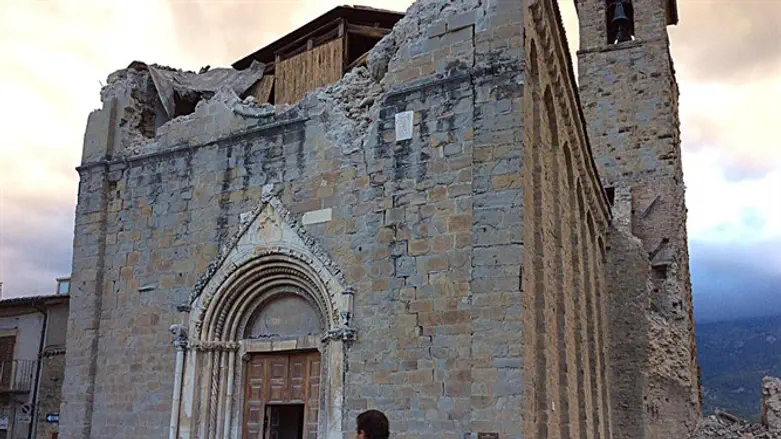
Giulio Meotti is a well known Italian journalist and author who writes an opinion column twice weekly for Arutz Sheva. He lives in Tuscany with his wife and two young sons.
Another earthquake has destroyed many Italian towns, tiny little villages on the hills and mountains that tourists come to see, not far from where I live. Over 250 Italians lost their lives in a few seconds and the terrible count of the dead has yet to be updated.
Amatrice, Arquata, Accumuli… These are the names of the destroyed towns. Strange names, so Italian. Seven years ago, another earthquake took away the lives of 300 Italians in L’Aquila.

There is no rational explanation for all these dead and for such destruction: it is simply Italy’s frail beauty. That is why tourists come here from all over the world. To see the fascinating Italian beauty that has survived from the Middle Ages, the symbols of a culture which once made Europe great.
The editors at Arutz Sheva asked me to write my impressions. What can I say that is not banal? I can say something about the 200 civilians under the rubble and saved by firemen, soldiers, ordinary people who volunteered.
This is Italy’s best face.
Italy’s economy is doing badly, people enjoy continuing a very lazy life but always tend to complain, the index of vitality of Italian society (culture, scientific discoveries, religious attendance and affiliation, birth rates)- all are in decay. It is when there is a disaster that Italians show their best face.
The videos of children extracted alive from the rubble, the fathers and mothers who explain on television how they lost their children, the grandmothers who saved children shielding them with their own bodies, this is the real story.
It is the same type of person in the story that tells of the astonishing courage of an Italian hostage in the face of his murder by Iraqi terrorists. Just before an Islamist thug fired two shots and killed Fabrizio Quattrocchi, a baker who went to work in Iraq as a bodyguard, he tore off his hood and looked his executioner in the eye. “Now I’ll show you how an Italian dies”, the defiant Quattrocchi said before being shot in the neck at point-blank range.
It is the story of my wife’s grandfather, a young soldier who in 1943 for two days held a position alone in a military trench in the Russian region of Don. When the army ordered the chaotic withdrawal, that soldier walked back to Italy from Russia, 2,226 kilometers through the snow and terrible cold, although severely injured, later losing a lung from the effort.
Italians are fortunate to have such heroes. And freedom-loving Westerners and Israelis are fortunate to have such friends.
